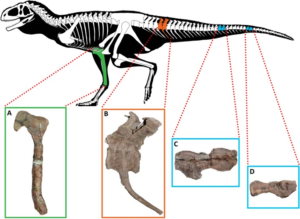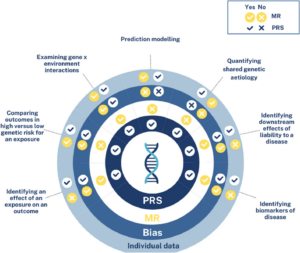

BMC Ecology and Evolution – New information on paleopathologies in non-avian theropod dinosaurs: a case study on South American abelisaurids
A recent study published in BMC Ecology and Evolution explores the pathology of theropods – bipedal carnivorous dinosaurs – finding evidence of non-injurious pathologies and suggesting that abelisaurids may have been prone to osteomyelitis.
Using CT scans and bone histology analysis, researchers examined the remains of three theropod species, suggesting new insights into the paleopathologies for non-tetanuran theropods. Among the specimens studied, several anomalies were uncovered, including fused vertebrae indicative of congenital disorders and signs of inflammatory arthritis. In one specimen, a theropod exhibited irregular bone formation in its tibia, presenting a rare indication of disease in a weight-bearing bone.
While the exact causes of these ancient afflictions remain uncertain, the study provides a glimpse into the health challenges faced by theropods and offers valuable clues about their evolutionary adaptations. By improving our understanding of paleopathology and unravelling the secrets buried within fossilized remains, researchers continue to piece together the fascinating history of prehistoric life on Earth.

BMC Medical Ethics – The Diversity Compass: a clinical ethics support instrument for dialogues on diversity in healthcare organizations
Navigating the complex landscape of ethics in healthcare is no easy feat, especially when it comes to addressing the diverse moral perspectives over what ‘good care’ actually involves.
Although clinical ethics support (CES) instruments play an important role in aiding healthcare professionals and organisations, current tools fail to adequately address the complexities of moral pluralism and intersectional aspects of diversity and social justice issues. However, a recent study published in BMC Medical Ethics showcases the recently developed Diversity Compass, designed to address this gap.
Developed through participatory methods, the Diversity Compass offers a groundbreaking approach to navigating complex moral dilemmas in healthcare settings. By providing practical guidance tailored to the diverse needs of patients and stakeholders, this innovative instrument empowers healthcare professionals to make ethically sound decisions that respect the values and rights of all individuals. With the Diversity Compass at their disposal, healthcare teams can chart a course toward greater inclusivity, understanding, and ethical excellence in patient care.

The recognition of domestic violence experiences in men, young people, and children has long been overlooked, leaving a critical gap in support services. Whilst initiatives such as IRIS (Identification and Referral to Improve Safety) have made strides in addressing the needs of women experiencing domestic violence, there is a growing need to extend this support to other vulnerable populations.
IRIS+ is an intervention developed to specifically cater to the needs of men and children/young people experiencing domestic violence, without diminishing the support and responses of affected women. In a study published in BMC Primary Care, researchers evaluate the feasibility of implementing the adapted IRIS+ intervention in England and Wales.
The IRIS+ intervention includes several components, including clinical training for primary care teams, a direct referral pathway for patients to advocate editors, individualized advocacy support, and referral to specialized group programs. The results demonstrated the accessibility and feasibility of the IRIS+ intervention, marking a significant step forward in addressing domestic violence across diverse demographics.
Although the findings are promising, they also underscore the need for further research to explore the implementation of IRIS+ on a larger scale. By advocating for inclusive and tailored interventions like IRIS+, we can begin to address the gap in domestic violence identification and support, ensuring that all individuals, regardless of gender or age, receive the care and assistance they need.

The golden takin (Burdorcas taxicolor bedfordi) – a species native to the Qin Mountains of China – faces an uncertain future due to the profound impacts of human activity on its habitat. Human encroachment has led to extensive habitat fragmentation and the construction of roads, severely disrupting the natural landscape and threatening the survival of the species.
In a study published in BMC Zoology, researchers utilized next-generation sequencing techniques on golden takin muscle samples collected across three geographical locations (Niubeliang, Zhouzhi, and Foping) in order to assess the population genetic diversity. The findings revealed inbreeding within the population and low levels of genetic diversity, largely attributed to the habitat fragmentation caused by human interventions.
Genetic diversity is crucial in order for species to adapt to changing environmental conditions and avoid the detrimental effects of inbreeding. With the environment continuing to evolve rapidly due to ongoing human activities, urgent conservation efforts are imperative to safeguard the future of the golden takin.
This research highlights the importance of implementing innovative conservation strategies to mitigate the adverse effects of habitat fragmentation and bolster genetic diversity. The authors propose several conservation initiatives, including the construction of ecological corridors to connect the existing meadow habitats, supporting genetic exchange with different populations. Implementing tourism management measures could also help to reduce the impact of human disturbance.
By prioritizing these efforts, we can strive to ensure the long-term survival and resilience of this endangered species in its natural habitat.

BMC Medical Genomics – A brief comparison of polygenic risk scores and Mendelian randomisation
The advent of large-scale genome-wide association studies has led to a substantial increase in the use of methodologies such as polygenic risk score analysis and Mendelian randomizations. However, there can be ambiguity about the equivalence of the two methods, and a lack of clarity regarding the optimal application.
An article published in BMC Medical Genomics explores the utility of these methods in aetiological epidemiology. Utilizing the relationship between sleep duration and body mass index as an applied example, the authors explore the nuanced differences and similarities between polygenic risk score analysis and Mendelian randomization.
By clarifying the strengths and limitations of each method, this research equips epidemiologists with invaluable insights for investigating complex genetic associations in population-based studies. With a clearer understanding of these methodologies, researchers can better navigate the complex terrain of genetic epidemiology.
Comments